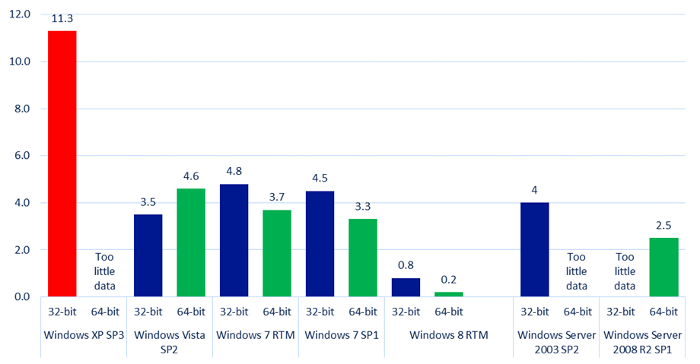It’s no secret that Microsoft is trying to convince everyone still running Windows XP to move to either Windows 7 or Windows 8, so the company keeps doing this with the help of a brand new post.
This time, Tim Rains, director of Trustworthy Computing, points to the security risks caused by sticking to Windows XP beyond the April 8, 2014 retirement date, explaining that the 11-year-old OS will soon become vulnerable “forever.”
“What is the risk of continuing to run Windows XP after its end of support date? One risk is that attackers will have the advantage over defenders who choose to run Windows XP because attackers will likely have more information about vulnerabilities in Windows XP than defenders,” Rains explains.
To prove his point, the Microsoft official has also published a graph included in the Microsoft Security Intelligence Report volume 14, stating that Windows XP is currently the operating system with the highest malware infection rate. Windows 7 and Windows 8 are obviously the most secure platforms right now.
What’s more, Rains reveals that Windows XP has been targeted by 45 Microsoft security bulletins between July 2012 and July 2013, 30 of which also affected Windows 7 and Windows 8.
Once the Windows XP’s support comes to an end, the operating system will be vulnerable forever, the company official explains.
“The very first month that Microsoft releases security updates for supported versions of Windows, attackers will reverse engineer those updates, find the vulnerabilities and test Windows XP to see if it shares those vulnerabilities. If it does, attackers will attempt to develop exploit code that can take advantage of those vulnerabilities on Windows XP,” he states.
“Since a security update will never become available for Windows XP to address these vulnerabilities, Windows XP will essentially have a ‘zero day’ vulnerability forever.”
Users, on the other hand, don’t really seem to care about Microsoft’s warnings. At this point, Windows XP is still powering more than 37 percent of computers worldwide, and only a few of them are actually planning to move to a newer platform.

 14 DAY TRIAL //
14 DAY TRIAL // 